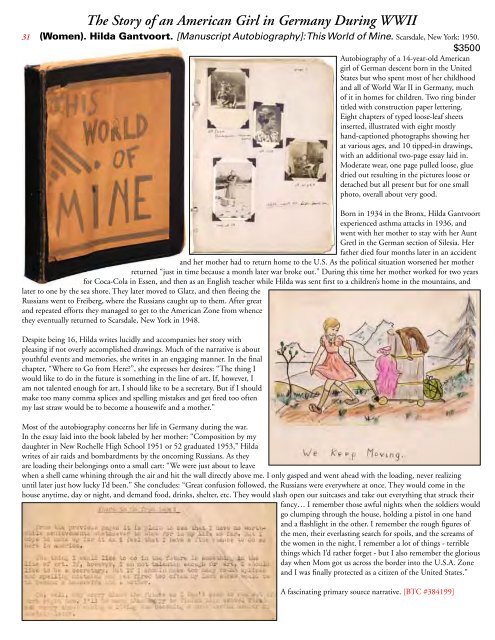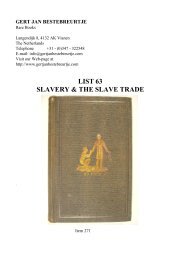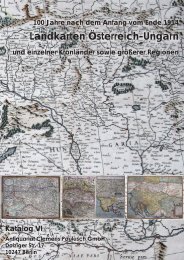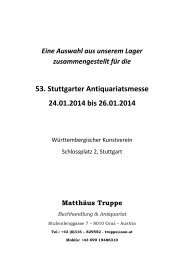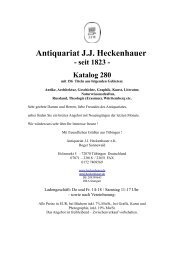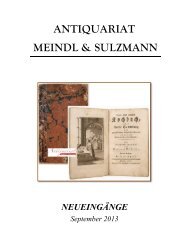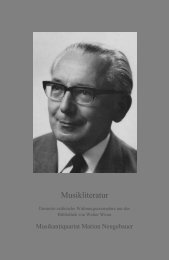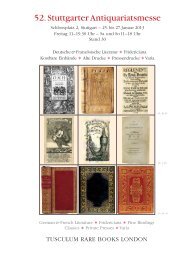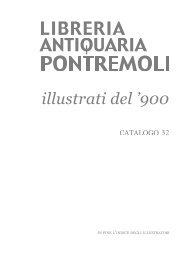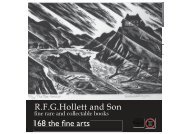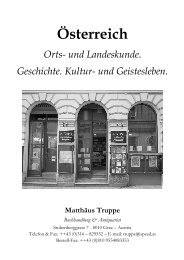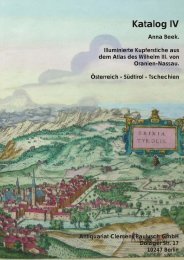Archives & Manuscripts #14 - International League of Antiquarian ...
Archives & Manuscripts #14 - International League of Antiquarian ...
Archives & Manuscripts #14 - International League of Antiquarian ...
You also want an ePaper? Increase the reach of your titles
YUMPU automatically turns print PDFs into web optimized ePapers that Google loves.
The Story <strong>of</strong> an American Girl in Germany During WWII<br />
31 (Women). Hilda Gantvoort. [Manuscript Autobiography]: This World <strong>of</strong> Mine. Scarsdale, New York: 1950.<br />
$3500<br />
Autobiography <strong>of</strong> a 14-year-old American<br />
girl <strong>of</strong> German descent born in the United<br />
States but who spent most <strong>of</strong> her childhood<br />
and all <strong>of</strong> World War II in Germany, much<br />
<strong>of</strong> it in homes for children. Two ring binder<br />
titled with construction paper lettering.<br />
Eight chapters <strong>of</strong> typed loose-leaf sheets<br />
inserted, illustrated with eight mostly<br />
hand-captioned photographs showing her<br />
at various ages, and 10 tipped-in drawings,<br />
with an additional two-page essay laid in.<br />
Moderate wear, one page pulled loose, glue<br />
dried out resulting in the pictures loose or<br />
detached but all present but for one small<br />
photo, overall about very good.<br />
Born in 1934 in the Bronx, Hilda Gantvoort<br />
experienced asthma attacks in 1936, and<br />
went with her mother to stay with her Aunt<br />
Gretl in the German section <strong>of</strong> Silesia. Her<br />
father died four months later in an accident<br />
and her mother had to return home to the U.S. As the political situation worsened her mother<br />
returned “just in time because a month later war broke out.” During this time her mother worked for two years<br />
for Coca-Cola in Essen, and then as an English teacher while Hilda was sent first to a children’s home in the mountains, and<br />
later to one by the sea shore. They later moved to Glatz, and then fleeing the<br />
Russians went to Freiberg, where the Russians caught up to them. After great<br />
and repeated efforts they managed to get to the American Zone from whence<br />
they eventually returned to Scarsdale, New York in 1948.<br />
Despite being 16, Hilda writes lucidly and accompanies her story with<br />
pleasing if not overly accomplished drawings. Much <strong>of</strong> the narrative is about<br />
youthful events and memories, she writes in an engaging manner. In the final<br />
chapter, “Where to Go from Here?”, she expresses her desires: “The thing I<br />
would like to do in the future is something in the line <strong>of</strong> art. If, however, I<br />
am not talented enough for art, I should like to be a secretary. But if I should<br />
make too many comma splices and spelling mistakes and get fired too <strong>of</strong>ten<br />
my last straw would be to become a housewife and a mother.”<br />
Most <strong>of</strong> the autobiography concerns her life in Germany during the war.<br />
In the essay laid into the book labeled by her mother: “Composition by my<br />
daughter in New Rochelle High School 1951 or 52 graduated 1953,” Hilda<br />
writes <strong>of</strong> air raids and bombardments by the oncoming Russians. As they<br />
are loading their belongings onto a small cart: “We were just about to leave<br />
when a shell came whining through the air and hit the wall directly above me. I only gasped and went ahead with the loading, never realizing<br />
until later just how lucky I’d been.” She concludes: “Great confusion followed, the Russians were everywhere at once. They would come in the<br />
house anytime, day or night, and demand food, drinks, shelter, etc. They would slash open our suitcases and take out everything that struck their<br />
fancy… I remember those awful nights when the soldiers would<br />
go clumping through the house, holding a pistol in one hand<br />
and a flashlight in the other. I remember the rough figures <strong>of</strong><br />
the men, their everlasting search for spoils, and the screams <strong>of</strong><br />
the women in the night. I remember a lot <strong>of</strong> things - terrible<br />
things which I’d rather forget - but I also remember the glorious<br />
day when Mom got us across the border into the U.S.A. Zone<br />
and I was finally protected as a citizen <strong>of</strong> the United States.”<br />
A fascinating primary source narrative. [BTC #384199]


